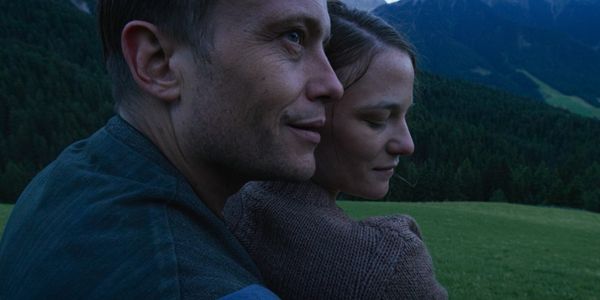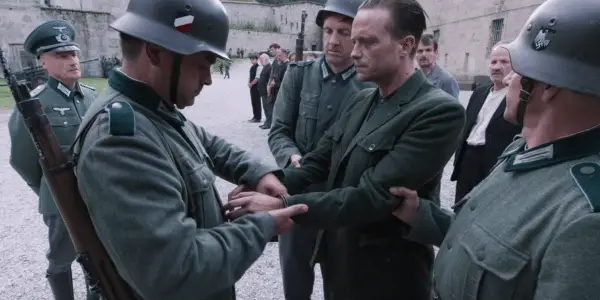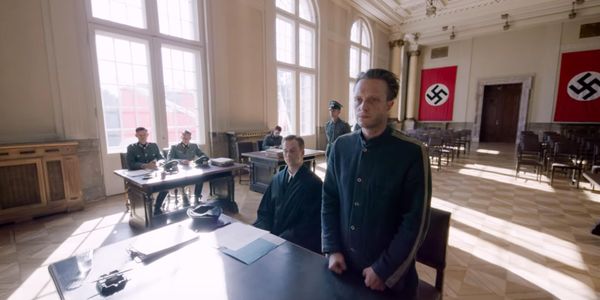A HIDDEN LIFE: Malick’s Political & Moral Prayer

Soham Gadre is a writer/filmmaker in the Washington D.C. area.…
“…for the growing good of the world is partly dependent on unhistoric acts; and that things are not so ill with you and me as they might have been, is half owing to the number who lived faithfully a hidden life, and rest in unvisited tombs.”
A Hidden Life takes its title from these final lines of George Eliot’s novel ‘Middlemarch’, which suggests that the maintenance of good we see in the world is partially dependent on the deeds of the people we never hear, see, or meet. It is an embodiment of the film’s central character Franz Jägerstätter (August Diehl), a real-life figure who I certainly had never heard of, who was thrust from his tucked-away mountain farming community of Radegund, Austria into a world infected by the growing fascism spreading from Nazi Germany.
Internal Ruminations
A deeply religious and internally conflicted figure, Franz is not a surprising character for Terrence Malick to gravitate towards. Malick’s movies have always spoken internally even when the external effects of the world infiltrate the existence of his characters. Even the films that are intrinsically tied to the machines of industry or world politics like Knight of Cups, Song to Song or The Thin Red Line impart their philosophical ruminations from the heads of individual people.

Malick is generally categorized as a religious filmmaker, his observations of the world funneled through biblical prose and the pondering of greater powers controlling the natural and physical worlds. Much of this is attributed to his upbringing, which he espouses in The Tree of Life but it would be incorrect to say that Malick claims to know the truth or the way the world works. After he watched Martin Scorsese’s Silence, he sent him a letter asking, “What does God want from us?” This is a question that Malick directly tries to answer in A Hidden Life. He does this in ways both cinematic and overtly political.
An Artistic Choice
The movie’s use of sound is what carries its sensation of deep religious purpose and introspection through and through. The chirping of birds, the echoes of voices, the rustling of grass, the drips of rain, even the small footsteps of a caterpillar, are prioritized as part of the movie’s soundscape. Combined with the ethereal lighting of its skies, the way light slowly pierces and eventually populates inside spaces, all join to give the sensation of being inside a church or temple, a place where Malick’s characters are with their own thoughts. There is an internal sense of purpose that develops in Franz through these sensations that no external force can defeat. Franz is presented a paper of declaration of loyalty to Hitler by Nazi Captain Herder (Matthias Schoenaerts) who says his signature can set him free to which he replies, “I already am free”.

While Malick is not averse to violence in his movies (many of his films feature death and murder, and one of his movies, The Thin Red Line, brutal acts of war), there is a conscious effort to relay violence in A Hidden Life from the standpoint of its coercion rather than its physicality. The consistent mental abuse and social alienation resulting from Franz and his wife Fani’s (Valerie Pachner) non-conformity to Nazi allegiance is depicted much more violently on its face (clear, elongated, unmistakable) than the beatings by Nazi guards (point-of-view, much more impressionistic and inferred).
In this way, the religious overtones Malick sets, which are much more overt and obvious than in any of his previous movies, demand a spiritual examination of death, one which stems beyond the severing or tearing of the physical body, and more to the severing of intangible relationships and the corrosion of a human camaraderie.
A Political Choice
Just as A Hidden Life is arguably Malick’s most directly religious film, it is also his most directly political and possibly by virtue of its subject matter, least poetic. While The Thin Red Line, by my account Malick’s ultimate masterpiece, was afforded the impressionistic and hypnotic melding of imperialism, war, and race with a greater and more metaphysical discussion of the human place in nature, A Hidden Life refuses to dance around in ambiguity.
The effects of power and evil are spelled out clearly through the experiences of Franz, and the conviction of his soul to follow a righteous path is steadfast and more unwavering as the film proceeds. There is no debate of the ethereal and nihilistic as there was between Private Witt and Corporal Welsh, no real dichotomy of choices between man’s place in the world and in the eyes of God. Instead Franz, and in turn, Malick, repeatedly knows what and who is right and his request of guidance from the church is more a request of acknowledgment and solidarity.

It is important to acknowledge the normalcy of evil so as to understand it is not apart from us. Terrence Malick acknowledges this repeatedly in A Hidden Life, where the movie is occasionally interrupted by documented footage of Adolf Hitler at rallies where children slowly raise their hands in a ‘seig heil’ or on the balcony of his house playing with his nieces and chatting it up with family, smiling, prancing. These moments are in juxtaposition with the slow infiltration of nationalism in everyday life in Radegund.
Filmmakers like Malick, or Mike Leigh (Peterloo) or Aki Kaurismaki (The Other Side of the Wind), who have played metaphorically with politics in many of their past films, have shown a common sense of political urgency and directness with their latest works as well. While his past films navigated unanswerable questions, here, Malick knows the answers and he knows we know them too. Perhaps this robs films like A Hidden Life from reaching the heights of Malick’s greatest works, but like its subject, Malick’s latest film is willing to sacrifice the poetic and enigmatic for the conspicuous and patent. It’s a clear moral decision as much as it is a cinematic one.
A Hidden Life opens in theaters in the United States on December 13th, 2019.
Does content like this matter to you?
Become a Member and support film journalism. Unlock access to all of Film Inquiry`s great articles. Join a community of like-minded readers who are passionate about cinema - get access to our private members Network, give back to independent filmmakers, and more.
Soham Gadre is a writer/filmmaker in the Washington D.C. area. He has written for Hyperallergic, MUBI Notebook, Popula, Vague Visages, and Bustle among others. He also works full-time for an environmental non-profit and is a screener for the Environmental Film Festival. Outside of film, he is a Chicago Bulls fan and frequenter of gastropubs.













